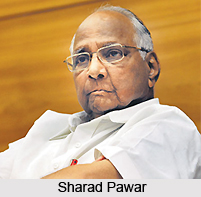 Sharad Pawar is the founder and President of the Indian political party Nationalist Congress Party (NCP) which he established in the year 1999 after dissociating from the Indian National Congress. He served as the elected Chairman of the Board for Control for Cricket in India from 2005 to 2008. He has been actively involved in United Nations and World Health Organization. Represented India leading the Disaster Management Team for United Nations, he has also an impressive record with United Nations for his excellent management of recovering Latur from an earthquake within a short time. "Marquis Who`s Who" is a US publisher of a number of books containing short biographical sketches of celebrated persons, describes influential world leaders over the last 100 years. Biography of Sharad Pawar has been enlisted in "Marquis Who`s Who". Only three other Indian politicians i.e., P. V. Narasimha Rao, Dr. Manmohan Singh and Shankarrao Chavan have been included in this contemporary biographical library.
Sharad Pawar is the founder and President of the Indian political party Nationalist Congress Party (NCP) which he established in the year 1999 after dissociating from the Indian National Congress. He served as the elected Chairman of the Board for Control for Cricket in India from 2005 to 2008. He has been actively involved in United Nations and World Health Organization. Represented India leading the Disaster Management Team for United Nations, he has also an impressive record with United Nations for his excellent management of recovering Latur from an earthquake within a short time. "Marquis Who`s Who" is a US publisher of a number of books containing short biographical sketches of celebrated persons, describes influential world leaders over the last 100 years. Biography of Sharad Pawar has been enlisted in "Marquis Who`s Who". Only three other Indian politicians i.e., P. V. Narasimha Rao, Dr. Manmohan Singh and Shankarrao Chavan have been included in this contemporary biographical library.
He leads the NCP delegation in the Lok Sabha, representing his home constituency of Baramati. He has a prominent place in Indian national politics as well as regional politics of Maharashtra. He also served as Minister of Agriculture and Minister of Consumer Affairs, Food and Public Distribution.
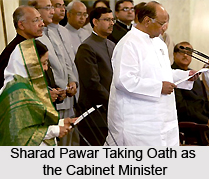 Early Life of Sharad Pawar
Early Life of Sharad Pawar
This Maratha strongman was born on 12th December 1940 in Katewadi village in Pune district, Maharashtra. Mr. Sharad Pawar went to Brihan Maharashtra College of Commerce (BMCC) in Pune. He was not a bright student but took active part in student politics. His first political act was when he organized a protest march for Goan Independence in Pravaranagar in 1956.
Political Career of Sharad Pawar
Representing the undivided Congress Party in 1967 he made his first entry to the Maharashtra Legislative Assembly from Baramati. In 1978, Yashwantrao Balwantrao Chavan, the first Chief Minister of Maharashtra after the division of Bombay State, and subsequently Deputy Prime Minister of India, was the political mentor of Sharad Pawar. Mr. Sharad Pawar broke away from the Congress to form an alliance government with the opposition Janata party. In February 1980, Indira Gandhi returned to power at the centre and this Progressive Democratic Front government was dismissed. In the elections that followed, the Congress party won the majority in state assembly and A.R. Antulay, took over as the chief minister of the state. Sharad Pawar remained a key opposition leader in the state assembly. For the first time, he won Lok Sabha election from Baramati Parliamentary constituency in 1984. He also won state assembly elections of March 1985 from Baramati and preferred to continue in state politics for a while and resigned from the Lok Sabha. In 1985 elections, while his Congress (S) won 54 seats out of 288 in the state assembly, he became the leader of the opposition.
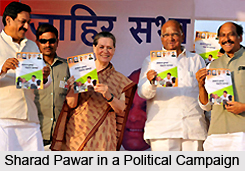 In 1987, Sharad Pawar decided to make a return to Congress (I) party after being out of it for over nine years. In June 1988, with the induction of Prime Minister and Congress President Rajiv Gandhi, Maharashtra Chief Minister Shankarrao Chavan was called into Union Cabinet as Finance Minister and Sharad Pawar was chosen to replace Chavan as Chief Minister. Sharad Pawar had the task of checking the rise of the Shiv Sena in state politics, which was a potential challenge to the dominance of Congress party in the state. In 1989 Lok Sabha elections Congress party won 28 seats out of 48 in Maharashtra. Though the Congress party maintained a respectable proportionate in the state and was not routed as in some other states like Rajasthan and Gujarat. The loss meant a loss of 15 seats compared with 1984. In February 1990, in the state assembly elections the alliance between the Shiv Sena and the Bharatiya Janata Party (BJP) showed a stiff challenge to the Congress. Though the Congress managed to retain power, it fell short of an absolute majority in the state assembly for the first time, winning 141 seats out 288. Sharad Pawar was sworn in as Chief Minister again on March 4, 1990 with the support of 12 independent MLAs.
In 1987, Sharad Pawar decided to make a return to Congress (I) party after being out of it for over nine years. In June 1988, with the induction of Prime Minister and Congress President Rajiv Gandhi, Maharashtra Chief Minister Shankarrao Chavan was called into Union Cabinet as Finance Minister and Sharad Pawar was chosen to replace Chavan as Chief Minister. Sharad Pawar had the task of checking the rise of the Shiv Sena in state politics, which was a potential challenge to the dominance of Congress party in the state. In 1989 Lok Sabha elections Congress party won 28 seats out of 48 in Maharashtra. Though the Congress party maintained a respectable proportionate in the state and was not routed as in some other states like Rajasthan and Gujarat. The loss meant a loss of 15 seats compared with 1984. In February 1990, in the state assembly elections the alliance between the Shiv Sena and the Bharatiya Janata Party (BJP) showed a stiff challenge to the Congress. Though the Congress managed to retain power, it fell short of an absolute majority in the state assembly for the first time, winning 141 seats out 288. Sharad Pawar was sworn in as Chief Minister again on March 4, 1990 with the support of 12 independent MLAs.
Rise of Sharad Pawar in Indian Politics
Sharad Pawar led the campaign for the Congress for the mid-term parliamentary elections of 1991 in Maharashtra. As a result the Congress bettered its performance by winning 38 seats out of 48 in the state. During the course of election campaign, former Prime Minister Rajiv Gandhi was assassinated. There were rumours that Pawar`s name was being considered for the Prime Minister`s post along with those of P.V. Narasimha Rao and Arjun Singh. However the Congress Parliamentary Party elected P.V. Narasimha Rao as its leader and he was sworn in as Prime Minister on June 21, 1991. Sharad Pawar became Minister of Defence. On June 26, 1991, Pawar took over as that portfolio, continuing till March 1993. After Pawar`s successor in Maharashtra, Sudhakarrao Naik stepped down, Rao sent Pawar back as Chief Minister of the state.
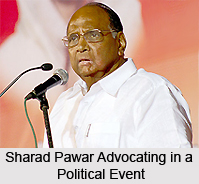 He was sworn in as Chief Minister for his fourth and most controversial term on March 6, 1993. Almost immediately, Mumbai, the financial capital of India and the state capital of Maharashtra, was rocked with series of bomb blasts on March 12, 1993.
He was sworn in as Chief Minister for his fourth and most controversial term on March 6, 1993. Almost immediately, Mumbai, the financial capital of India and the state capital of Maharashtra, was rocked with series of bomb blasts on March 12, 1993.
G. R. Khairnar, the Deputy Commissioner of the Brihanmumbai Municipal Corporation, made a series of accusations against Pawar for being involved in corruption and protecting the criminals. Though Khairnar failed to produce any evidence in support of his claims, it inevitably affected Pawar`s popularity. Notable social worker Anna Hazare started a fast unto death to demand expulsion of 12 officers of the Forest Department of Government of Maharashtra, who had been accused of corruption. The opposition parties accused Pawar`s government of trying to shield the corrupt officers. Further, there was a sex scandal at Jalgaon district in which a number of young girls were subjected to sexual abuse, which expanded to involve local municipal corporations belonging to Congress. To make matters worse for the Congress party, there was a stampede in the march of Gowari tribe`s people at Nagpur on November 23, 1994, in which 123 people were killed. The march had been to demand reservations in educational institutes and jobs. Allegations were made that the mishap occurred because welfare minister Madhukarrao Pichad did not meet with the delegation of the Vanjara people in time. Though Pichad stepped down owing moral responsibility for the mishap, this incident was another setback to Sharad Pawar`s government.
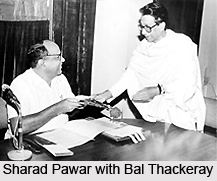 The elections to the Vidhan Sabha were due to be held in 1995. The Shiv Sena and BJP combine was leading the Congress in the polls, and there was widespread rebellion in the Congress party. The Shiv Sena-BJP combine won 138 seats while Congress party retained only 80 seats in the state assembly. Sharad Pawar had to step down and Shiv Sena leader Manohar Joshi took over as Chief Minister on March 14, 1995. Till the Lok Sabha elections of 1996, Sharad Pawar served as the Leader of the Opposition in State Legislative Council. In the 1996 general elections, he won from the Baramati seat and has not returned to the State Assembly since.
The elections to the Vidhan Sabha were due to be held in 1995. The Shiv Sena and BJP combine was leading the Congress in the polls, and there was widespread rebellion in the Congress party. The Shiv Sena-BJP combine won 138 seats while Congress party retained only 80 seats in the state assembly. Sharad Pawar had to step down and Shiv Sena leader Manohar Joshi took over as Chief Minister on March 14, 1995. Till the Lok Sabha elections of 1996, Sharad Pawar served as the Leader of the Opposition in State Legislative Council. In the 1996 general elections, he won from the Baramati seat and has not returned to the State Assembly since.
In June 1997, for the post of Congress President he unsuccessfully challenged Sitaram Kesri. In the mid-term parliamentary elections of 1998, Sharad Pawar not only won from his constituency, Baramati but also led the Congress to a significant win in Maharashtra. He moved with the Republican Party of India (Athvale) and Samajwadi Party for the elections in the state brought rich dividends and the Congress party and allies won 37 seats out of 48 in the state. Sharad Pawar served as Leader of Opposition in 12th Lok Sabha.
In June 1999, Pawar and Sangma founded the Nationalist Congress Party. His party had to come into the line with the Congress party to form a coalition government in Maharashtra as neither party could win an absolute majority on its own in the 1999 assembly elections. Pawar, however, did not return to state politics, and Vilasrao Deshmukh of the Congress was chosen as Chief Minister, with Chagan Bhujbal representing the Nationalist Congress Party as his deputy. The alliance has endured at the national and state level to this day. Sharad Pawar joined the United Progressive Alliance government headed by Dr Manmohan Singh as the Minister for Agriculture and Food After 2004 Lok Sabha elections. On November 29, 2005, he was elected President of Board of Control for Cricket in India (BCCI).
Pawar is known to be a great talent-spotter with enormous grassroots knowledge. He knows every district and taluka of Maharashtra, and possibly every leader in each. He was the one who suggested a political career to Sub-Inspector Sushilkumar Shinde way back in 1973. Today Shinde is the minister of power in the government of India. His biggest achievement came when he became the Chief Minister of Maharashtra for the first time aged only 38 in 1978. This he did by toppling the Congress government of Vasantdada Patil, split the party, and formed a government in coalition with the Janata Party under the banner of the Progressive Democratic Front. With such a solid base, Pawar has been able to retain his influence even when he has been out of the Congress, like in the period from 1978 to 1986, or now, after forming the Nationalist Congress Party in 1999. Unlike many other politicians, Pawar also believes in entrepreneurship and attracting foreign investment. But Pawar has failed to expand his base beyond western Maharashtra.
Sports Administration Posts Held by Sharad Pawar
•Mumbai Cricket Association
•Maharashtra Wrestling Association
•Maharashtra Kabbadi Association
•Maharashtra Kho Kho Association
•Maharastra Olympics Association
•Board of Control for Cricket in India President 2005 - 2008
•International Cricket Council Vice President
•International Cricket Council President.
Personal Life of Sharad Pawar
Mr. Sharad Pawar is married to Pratibha. They have one daughter, Supriya who is married to Sadanand Sule and is active now into politics.






